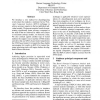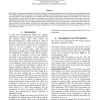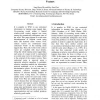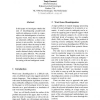125 search results - page 4 / 25 » Similarity-Based Methods for Word Sense Disambiguation |
ACL
2004
13 years 8 months ago
2004
We introduce a new method for disambiguating word senses that exploits a nonlinear Kernel Principal Component Analysis (KPCA) technique to achieve accuracy superior to the best pu...
LREC
2010
13 years 8 months ago
2010
In this article, we present an experiment of linguistic parameter tuning in the representation of the semantic space of polysemous words. We evaluate quantitatively the influence ...
COLING
2002
13 years 7 months ago
2002
It is popular in WSD to use contextual information in training sense tagged data. Co-occurring words within a limited window-sized context support one sense among the semantically...
TAL
2010
Springer
13 years 5 months ago
2010
Springer
Mihalcea [1] discusses self-training and co-training in the context of word sense disambiguation and shows that parameter optimization on individual words was important to obtain g...
ACL
2001
13 years 8 months ago
2001
In this paper we investigate whether the task of disambiguating pseudowords (artificial ambiguous words) is comparable to the disambiguation of real ambiguous words. Since the two...




